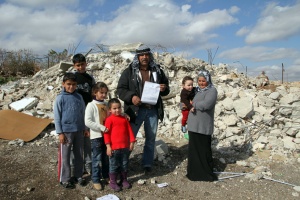- About
- News
-
Advocacy
- Accountability & Litigation
- International Advocacy
- National Advocacy
- Capacity Building
- Documentation
- FAI Unit
- Al-Haq Publications
- Library


- About
- News
-
Advocacy
- Accountability & Litigation
- International Advocacy
- National Advocacy
- Capacity Building
- Documentation
- FAI Unit
- Al-Haq Publications
- Library

On 23 January, two Palestinian families comprising of 52 people, including dozens of children, were forcibly removed from their homes in East Jerusalem by Israeli forces who then demolished the homes with the pretext that they lacked a building permit.
Yousef Muhammad Jahalin
 At approximately 11:00 pm on 23 January, Israeli soldiers, accompanied by workers from the Israeli Civil Administration and a bulldozer, forcibly removed 32 family members after demolishing their homes in Wa’r al-Beik southeast of ‘Anata (Jerusalem governorate). Yousef Muhammad Jahalin (37-years-old) is a Palestinian Bedouin who, along with his immediate and extended family, is now homeless following the demolition operation.
At approximately 11:00 pm on 23 January, Israeli soldiers, accompanied by workers from the Israeli Civil Administration and a bulldozer, forcibly removed 32 family members after demolishing their homes in Wa’r al-Beik southeast of ‘Anata (Jerusalem governorate). Yousef Muhammad Jahalin (37-years-old) is a Palestinian Bedouin who, along with his immediate and extended family, is now homeless following the demolition operation.
Yousef woke up that morning to the sounds of vehicles moving around his house. He went out and found about 100 Israeli soldiers and workers with a large bulldozer. When the soldiers saw him they immediately ordered him to vacate the house within five minutes and sent in workers to remove the furniture.
The workers threw the furniture in a pile on the ground and scattered the family’s stock of flour, sugar and oil. Yousef tried to stop them but was consequently beaten and searched by a group of around ten soldiers. The bulldozer eventually demolished the five structures used as housing for all 32 members of Yousef’s family. They were all forced to sleep near the rubble without shelter on that cold winter night. The International Committee of the Red Cross (ICRC) set up tents for the families the following day where they now reside.
The homes of Yousef and his family were previously demolished in 2004. They were rebuilt but remained under threat. Yousef received the most recent demolition order on 23 October 2011 but he could not afford to hire a lawyer to submit an appeal against the order (Al-Haq Affidavit No. 7033/2012).
Ahmad ‘Umar Al-Lihaliya
 On 23 January at around 11:00 pm, Israeli occupying forces demolished Ahmad ‘Umar al-Lihaliya’s house in Al-Fhedat area, east of ‘Anata (Jerusalem governorate), rendering homeless 20 of his family members, of whom 13 are children.
On 23 January at around 11:00 pm, Israeli occupying forces demolished Ahmad ‘Umar al-Lihaliya’s house in Al-Fhedat area, east of ‘Anata (Jerusalem governorate), rendering homeless 20 of his family members, of whom 13 are children.
Ahmad woke up at around 3 am that morning because of loud knocking on his door. When he opened the door, he saw about 50 Israeli soldiers accompanied by a Caterpillar bulldozer and a Hyundai digger. One of the soldiers ordered him to vacate the house within ten minutes. After that time, soldiers began entering the house with workers from the Israeli Civil Administration in order to remove the furniture. When Ahmad and his wife tried to stop them, they were physically assaulted by a group of around seven soldiers. They were then dragged, along with the rest of their family, outside the house. It took the bulldozer about one hour to demolish their house. Ahmad and his family are now living in two tents that have been set up by the ICRC.
Al-Lihaliya house was first demolished in 2004 but was rebuilt in 2011 with the help of Palestinian, Israeli and international activists. Ahmad and his family moved into the new house in July 2011. On 19 January 2012, the Israeli Civil Administration issued a new demolition order giving Ahmad and his family three days to demolish the house before the authorities would proceed with the demolition. Ahmad contacted a lawyer for help but was not able to avert the demolition order due to the short notice (see Al-Haq Affidavit No. 7034/2011).
Building in East Jerusalem
Palestinian Jerusalemites are only allowed to build on 7 per cent of the land in Jerusalem, even though they make up about 30 percent of the city’s population. Despite a shortage of around 25,000 housing units in East Jerusalem; the Jerusalem Municipality only grants 50 to 100 building permits per year for Palestinians.
The Palestinian population of East Jerusalem is also faced with discrimination in urban planning as Israel designates land surrounding Palestinian neighborhoods as “green land” or “un-zoned land” where construction is prohibited.
Additionally, the cost of permits and the legal aid required to obtain these permits usually exceeds the financial capabilities of the average East Jerusalem Palestinian resident.
The discriminatory policies of obtaining building permits force many Palestinians in East Jerusalem, such as Yousef and Ahmad, to build shelters for their families without the required Israeli building permits in an attempt to avoid being forcibly transferred from the city by Israeli forces.